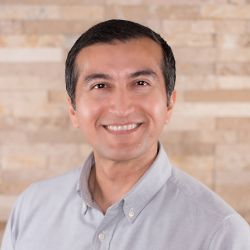- About Archives
- About SAA
- Careers
- Education
- Publications
- Advocacy
- Membership
 Mario H. Ramirez
Mario H. RamirezCLIR Postdoctoral Fellow in Data Curation for Latin American and Caribbean Studies, Indiana University, Bloomington
“My interest in joining the SAA Council is to press the organization even further toward a rigorous analysis of its commitments to diversity and inclusion, and to help engender significant shifts in how its policies and programs address structural forms of inequity.”
PROFESSIONAL EXPERIENCE
EDUCATION
PROFESSIONAL ACTIVITIES
SELECTED PUBLICATIONS AND AWARDS
SELECTED PRESENTATIONS
QUESTION POSED BY NOMINATING COMMITTEE
As a governing leader of SAA, how will you use your three years on the SAA Council to provide value to SAA members, to increase opportunities for participation for all members, and to ensure a welcoming and inclusive environment in which SAA members can share, learn, and grow together?
CANDIDATE'S RESPONSE
In the past decade, necessary and concerted changes have taken place within SAA’s committees and governing bodies that have begun to address the evolving makeup of the profession and the multiple needs of the members which the organization aims to represent and support. With increasing numbers of representatives from communities of color, for example, among leadership bodies such as the Nominating Committee and the SAA Council itself, the critical need to redistribute decision making power within the organization and to incorporate multiple voices in the determination of its future, has been more foregrounded. Indeed, the endorsement in August 2018 of the Protocols for Native American Archival Materials is indicative of the importance of having individuals with different life experiences at the proverbial table. In contrast to the SAA that I first joined in the early 2000s, the organization has started taking steps toward challenging its own norms and biases, and to move beyond a mere rhetorical adherence to inclusivity and plurality, and a surface engagement with the rich and varied histories, identities, and political and cultural investments which members bring to the profession.
My interest in joining the SAA Council, and what I want to spend my three years working on in collaboration with both leadership and members, is to press the organization even further toward a rigorous analysis of its commitments to diversity and inclusion, and to help engender significant shifts in how its policies and programs address structural forms of inequity. Focusing on the economic, political, cultural, and environmental barriers that challenge our members and communities is key for our growth as a profession. Guided by my long-standing commitment to social justice, and the representation and agency of historically marginalized communities, I want to amplify the spaces occupied by working-class, LGBTQIA, disabled, and communities of color, among others, and to contribute toward increasing their opportunities to flourish and transform the profession. More than a mere cosmetic engagement with diversity, I want us to further challenge our ability to question our place within systems of power and oppression and, in turn, to ask ourselves who is really empowered to speak or assert agency within SAA. Although admittedly a tall order for three years, my hope is that I can make even a small contribution toward transforming standing institutional standards and practices, and increasing the depth of our commitments to creating empowering and empathetic spaces within the organization where the insights and life experiences of all of our community members are heard and accounted for.
Slate of Candidates |
The Nominating Committee has slated the following SAA members as candidates for office in the 2019 election: